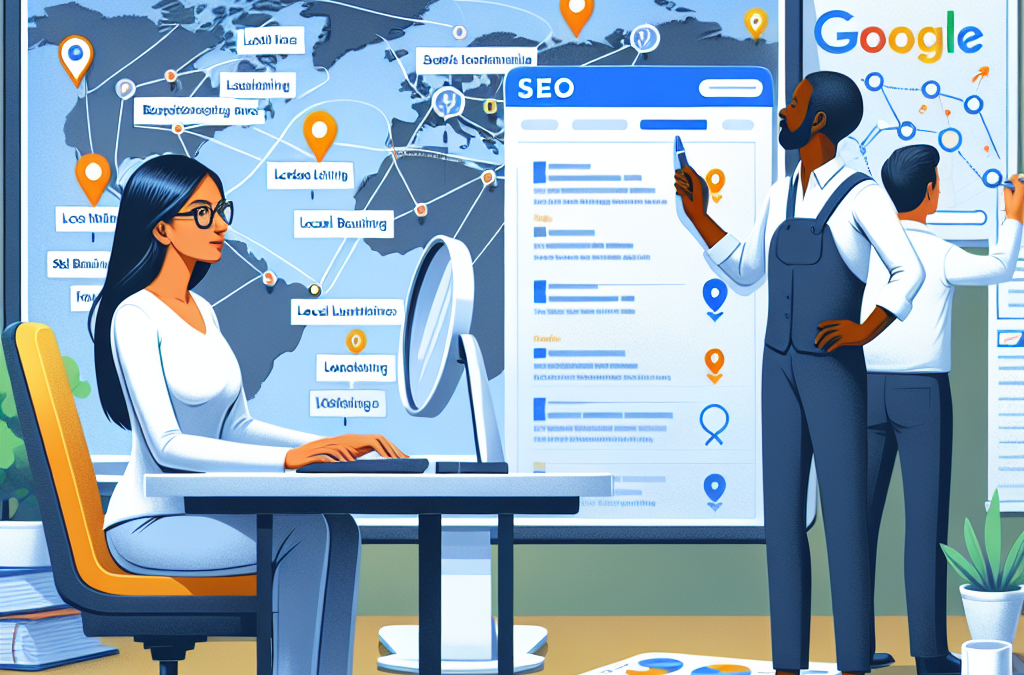Understand Your Audience
Know Who You’re Targeting
Identifying your ideal audience is truly the foundation of effective local SEO. When I first started consulting, I spent a ton of time figuring out who really needed my services. What demographics were they in? What challenges were they facing? The better you know your audience, the more effectively you can tailor your content and marketing strategies.
Once you have a clear idea of your target audience, it becomes easier to create content that resonates with them. Think about their pain points and the language they use. This is more than just demographic information; it’s about understanding their needs and preferences. It’s all about being human and relatable.
Also, never shy away from asking existing clients about their motivations for choosing you. It provides invaluable insights and helps refine your marketing approach. Your audience should always guide your SEO efforts.
Research Keywords that Connect
Keyword research is vital in local SEO. It took me a while to get my head around how to effectively find keywords that not only describe my services but are actually what my potential clients are typing into Google. Tools like Google Keyword Planner or SEMrush can be lifesavers here.
Start with localized keywords, phrases that combine your services with your location. For instance, if I’m a marketing consultant in Boston, I’d want to target phrases like “marketing consultant Boston” or “digital marketing services in Boston.” This specificity helps connect you with the right clients looking for your services.
It’s also important to keep an eye on trending keywords to adapt your strategy accordingly. Markets change, and flexibility is key. Keep revisiting your keyword strategy to ensure it aligns with what your audience is searching for.
Create Customer-Centric Content
When I talk about customer-centric content, I really mean content that speaks directly to your audience. Start by thinking about the questions your clients frequently ask. Creating blogs or FAQs around these topics can establish you as an authority in your niche. It gets easier as you create more content and discover what resonates with your readers.
Video content can also be incredibly effective. I’ve had great success with short videos where I explain common issues that clients face—this not only drives engagement but makes your brand more accessible. And hey, people love visuals!
Lastly, always strive to provide value. The best kind of content doesn’t just promote your services; it educates and empowers your audience. Trust me, building a reputation for helpfulness goes a long way in attracting the right clientele.
Optimize Your Google My Business Profile
Claim and Verify Your Listing
Your Google My Business (GMB) profile is probably one of the most significant assets you have for local SEO. When I first started out, I didn’t realize how crucial it was to claim and verify my listing. This not only enhances your visibility in local searches but builds credibility. If potential clients see accurate information about your business, they’re more likely to trust you.
To claim your GMB, you need to provide essential details about your business, including name, address, and phone number. Also, don’t forget to verify your listing, which might require a postcard verification process. It may seem like a hassle, but it’s absolutely worth it.
Once verified, you can manage vital information like business hours and services. Keeping this updated ensures that clients always have the latest information about you, which can help drive traffic and inquiries.
Enhance Your Profile with Engaging Content
After claiming your listing, the next step is to fill it up with engaging content. When I began enhancing my GMB profile, I made sure to include high-quality images and videos that showcase not only my services but also my personality. Friendly faces resonate—you want potential clients to see the real you!
Also, don’t forget to utilize the options for posting updates, offers, or upcoming events. It keeps your profile dynamic and appealing. Plus, search engines tend to favor active listings that regularly update their content.
Don’t overlook the importance of gathering reviews as well. Encouraging satisfied clients to leave reviews on your GMB page not only boosts your credibility but also your ranking in local search results. Everyone loves to see social proof!
Utilize Posts and Q&A Features
Google My Business allows you to use posts for sharing news, updates, and promotions. I started using this feature regularly and I’d advise you to do the same! It’s a fantastic way to engage with potential clients. When you highlight what you offer or share tips or insights, it can make a huge difference.
Another cool feature is the Q&A section in GMB. I make it a habit to regularly check this space to answer any questions: it shows you’re not just a business; you’re a resource. Responding promptly reflects your attentiveness and builds deeper connections with clients.
Creating a little engagement and interaction through these features helps you stand out. Your audience feels valued, and that’s a win-win in my book!
Leverage Local Link Building
Connect with Local Businesses
In my experience, building relationships with other local businesses has been incredibly beneficial for enhancing my local SEO. For instance, collaborating with a local marketing agency can lead to shared resources or joint ventures, and guess what? You can also exchange links, which boosts your credibility.
Attend local networking events and don’t hesitate to reach out to businesses directly. Get creative with your partnerships by co-authoring content or promoting each other’s services. This not only enhances your visibility but helps create a community of support.
When others begin to link back to your website, search engines view this as a validation of your business presence. It’s all about community and connections—strong ties will undoubtedly pay off in the long run.
Get Listed in Local Directories
Another effective method is getting your business listed in local online directories. This was a game-changer for me! Sites like Yelp, Yellow Pages, and local Chamber of Commerce directories are fantastic platforms for building a local footprint.
When adding your business to these directories, make sure to optimize your listings with accurate and consistent information, including your NAP (Name, Address, Phone number). It strengthens your online presence and helps with local search rankings.
Plus, being featured in local directories lends credibility to your brand and allows you to reach clients who might otherwise not stumble across your website. It’s incredibly effective—don’t skip this step!
Utilize Guest Blogging Opportunities
Guest blogging has been pivotal to my local SEO journey. It allows you to share your expertise while also building links back to your site from reputable platforms. Search for local blogs or websites within your niche that accept guest contributions.
Not only does guest blogging give you exposure to a wider audience, but it also enhances your authority. When I started this, the feedback was overwhelmingly positive from both my clients and my peers. People appreciate valuable insights, and they tend to discover more about your services through this approach.
And remember, it’s important to select blogs with a decent following. The better the platform, the more traffic you can drive back to your own website. It’s all about being strategic.
Measure and Analyze Results
Track Your SEO Performance
After all the hard work you put into local SEO, measuring your results is what will tell you what’s working and what’s not. In the beginning, I was overwhelmed with the different metrics to track, but tracking tools like Google Analytics made it far more manageable.
Focus on metrics like organic traffic, bounce rate, and conversion rates. Analyzing these can provide valuable insights into audience behavior, helping you tweak your strategies effectively. It’s like having a roadmap for improvements!
Don’t just look for short-term results; consider long-term trends as well. This helps in crafting a more coherent strategy. Remember, SEO is not a one-and-done deal; it’s an ongoing journey.
Solicit Client Feedback
Another crucial part of measuring results is to engage with your clients for feedback. I’m always sending out post-consultation surveys to get their insights on what worked for them and what could be improved. This feedback loop is essential to fine-tune your services and align them better with client expectations.
Listening to your clients not only improves your services but encourages them to feel invested in your offerings. Their testimonials or feedback can also serve as compelling content to promote your business.
Don’t underestimate the power of open communication—clients appreciate a consultant who wants to grow and evolve based on their experiences.
Stay Updated with SEO Trends
Finally, it’s super essential to stay updated on the latest SEO trends and algorithm changes. Search engines are constantly evolving, and I can’t stress how important it is to stay ahead of the game. Follow industry blogs, listen to podcasts, or join local SEO groups to keep your insights fresh.
Engaging with the community not only helps you stay updated—it can lead to strategic partnerships or learning opportunities that enhance your business. Knowledge truly is power, and being informed makes a big difference.
Even if you think you’ve got it all figured out—keep learning! The SEO landscape is continually changing, and adaptability is key to sustained success.
Frequently Asked Questions
1. How important is local SEO for consultants?
Local SEO is crucial for consultants because it helps you connect with potential clients in your area. It increases visibility, builds credibility, and drives targeted traffic to your website.
2. What should I include in my Google My Business profile?
Your GMB profile should include accurate business name, address, phone number, business hours, high-quality images, and engaging descriptions. Regular posts and customer reviews are also beneficial!
3. How can I find the right keywords for my business?
You can use tools like Google Keyword Planner or SEMrush to research keywords. Focus on local and relevant key phrases that your potential clients might use when searching for your services.
4. Why is link building important for local SEO?
Link building enhances your authority and credibility, boosts your visibility in search results, and connects you with potential clients and referral sources in your local community.
5. How can I measure the success of my local SEO strategies?
Utilizing tools like Google Analytics can help you track key performance indicators such as organic traffic, bounce rates, and conversion rates, which provide insights into the effectiveness of your local SEO tactics.


